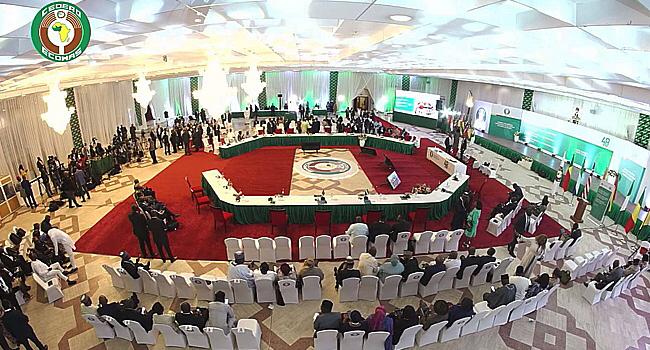
ECOWAS Parliament
ECOWAS Parliament split over military intervention in Niger
ECOWAS Parliament is divided over the option of military intervention in resolving the political impasse in the Niger Republic following the July 26 coup which ousted the civilian president Mohammed Bazoum by soldiers.

It would be recalled that on Thursday, President of ECOWAS, Omar Alieu Touray approved military intervention in Niger Republic while reading out the resolution of the sub-regional body on the Niger coup at the end of the extraordinary meeting in Abuja.

According to the sub-regional body, all efforts made to dialogue with Niger Republic’s military junta have been “defiantly rejected by the coup leaders,” and that they condemn the continuous detention of the ousted former president of Niger, Mohamed Bazoum and his family members.
ECOWAS urged the African Union (AU), partner countries and institutions to support the resolution taken by it, even as it decried that several efforts have been made to have peaceful dialogue with the military junta in Niger but all were rebuffed.
The sub-regional body further directed its ‘Committee of the Chief of Defence Staff to activate the ECOWAS standby force with all its elements immediately.’
It, however, declared willingness to embrace diplomacy in resolving the political crisis in the country.
“Direct the committee of the Chief of Defense Staff to activate the ECOWAS Stan-by force with all its elements immediately.
“Order the deployment of the ECOWAS stand-by force to restore constitutional order in the Republic of Niger,” the ECOWAS resolutions read in parts.
However, while, some members of the ECOWAS Parliament called for actions that would nip in the bud military incursion within the region, during Saturday’s plenary, others identified diplomacy and dialogue as the best approach to tackling the crisis.
No fewer than 22 parliamentarians participated in the virtual extraordinary meeting to discuss the political crisis in Niger.
Some members who were against military intervention highlighted the economic woes that the people of Niger could experience if invaded.
Ali Djibo, from Niger Republic said already at least 9,000 schools had been closed down owing to the crisis.
“War will only compound the economic woes the peoples of the sub-region are already going through.
“As we speak, over a thousand trucks, loaded with goods, are stranded at the border.
“If a coup happened in Nigeria or Cote’d’Iviore tomorrow, where’s the ECOWAS going to mobilise troops to fight the Nigerian or Ivorian military? How many borders are we going to close?
“We must also bear in mind that if we’re applying the ECOWAS treaty, it should be applicable to all.”
Members of the ECOWAS Parliament making a case for military intervention in Niger said diplomacy had contributed in no small measure to the increase in the spate of military takeover of government in the West African sub-region.
Contributing, Adebayo Balogun, posited that ECOWAS leaders were proposing military action to remove the junta, not clamouring for a full-fledged war, as he recalled that Niger was a signatory to ECOWAS’ revised protocol on non-military intervention.
Also, Bashir Dawodu expressed the belief that the body should open itself up to the possibility of a military option and apply pressure on the putschists while exploring dialogue.



